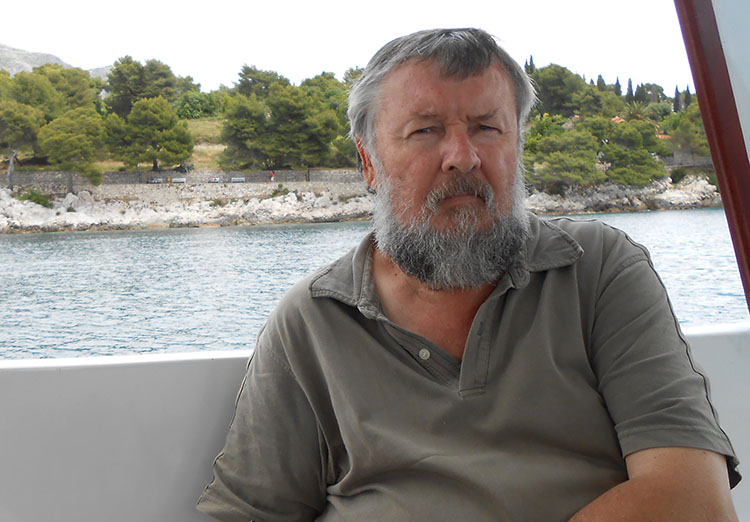I’m a breast cancer survivor of 25 years after being diagnosed about two months before my 37th birthday. My mother died of this disease at the age of 42 (nine months after her diagnosis and double mastectomy), but like other men, I had no idea men could get breast cancer too!
I had been admitted into hospital on Friday, biopsy on Saturday, discharged on Father’s Day, phone call on Monday to be at the specialist’s rooms, at which time I rang my wife to come with me. I remember seeing a book open on the specialist’s desk with diagrams of breast cancer and him telling me about my diagnosis. I was told to go home, pack my bag and was in hospital that evening in preparation for a left-sided mastectomy the next day. I don’t actually remember my response at that point, but I clearly remember waking up at 2am in my hospital bed in a cold sweat – that is when the shock of it all set in.
How did I find the lump in my chest? It was my wife Mary-Ann who found the lump and got me into see our GP. Little did I know that when she made the appointment, she told the receptionist to tell our doctor my mother had died of breast cancer. Our doctor was very good – at that time the surgeon was part of the medical practice our family attended, so the process of getting me to have the biopsy and admission into hospital all ran very smoothly, so smoothly in fact that I had little time to dwell on the whole issue. I can sort of recall the surgeon saying that men get cysts all the time – not sure now in hindsight whether that is actually what he said or whether I was hoping that was the case. We are going back 25 years ago when there was not the knowledge there is today – diagnosis made, options not given, no testing to see what type of breast cancer – just straight into surgery. It came to light a bit later that no histopathology was performed on the lump removed from my breast – just that it was very calcified.
Back when I had the surgery it was the norm to stay in hospital for a couple of weeks, not like now – keeping the stay in hospital minimal as home environment is so much more conducive to recovery both physically and emotionally. I was discharged with no referrals for physiotherapy or psychological assistance – left with literally nothing – I often wonder if they just didn’t know what to do with me being a male with breast cancer. My wife was working in health care at the time and arranged for me to have hydrotherapy, which helped with my left arm movement and psychological well-being.
Returning to work was the best therapy – back out there with mates from the various building trades. Many of my customers held off having renovations and other work done until I was ready. To this day I am still very thankful to them. There were some people though, I guess because they didn’t know what to say, who never got back in contact with me. This also applied to friends.
There was chemo and Tamoxifen for five years. Regular mammograms, blood tests and specialist appointments still continue, especially in light of being diagnosed with non-Hodgkin lymphoma four years ago this coming April. Relief was so immense when this was found not to be a secondary cancer. A stand-alone cancer, it was treated with surgery and regular check-ups. I cannot believe the difference in processes and communication 20 years on after having had breast cancer.
I was advised in September 2012 that it was likely I may have an inherited tendency to develop breast cancer, but when tested for the BRCA1 and BRCA2 genes in 2013 the laboratory did not find the genetic explanation of my personal and family history of breast cancer. I was advised “the test result is a common and frustrating finding” and “it highlights that there is much about inherited cancer that is not known”. I was also advised the test result had not excluded the diagnosis of familial cancer and “that it is clear that there is an inherited predisposition to develop breast cancer” and that I would be contacted when further information comes to light.
Mary-Ann and I started dragon boat paddling 13 years ago with a breast cancer team. We have participated in the Australian Masters in Canberra 13 years ago, winning silver in the breast cancer survivor category. Dragon boat paddling is something Mary-Ann and I do together three times a week, as well as on race days and in other events. It has consolidated our relationship, especially in light of her being diagnosed with breast cancer in January 2015, for which she had a lumpectomy.
The fact that both Mary-Ann and I have had breast cancer is of concern to me because of our two daughters. They are now in the medical system having both linked in with breast specialists – Vanessa receiving medical support in Adelaide and Louise in Canberra. Both will receive annual MRIs until the age of 40, after which time they will be eligible to undergo mammograms through the public health system and other tests that may be required, including genetic testing.
Our message that “men get breast cancer too” is something that both Mary-Ann and I, and our club are passionate about. It still amazes me that the majority of men I speak to still do not realize this can happen.
Education is an ongoing element of changing people’s’ attitudes – so it’s up to all of us to do just that – share the fact that “men get breast cancer too”.

